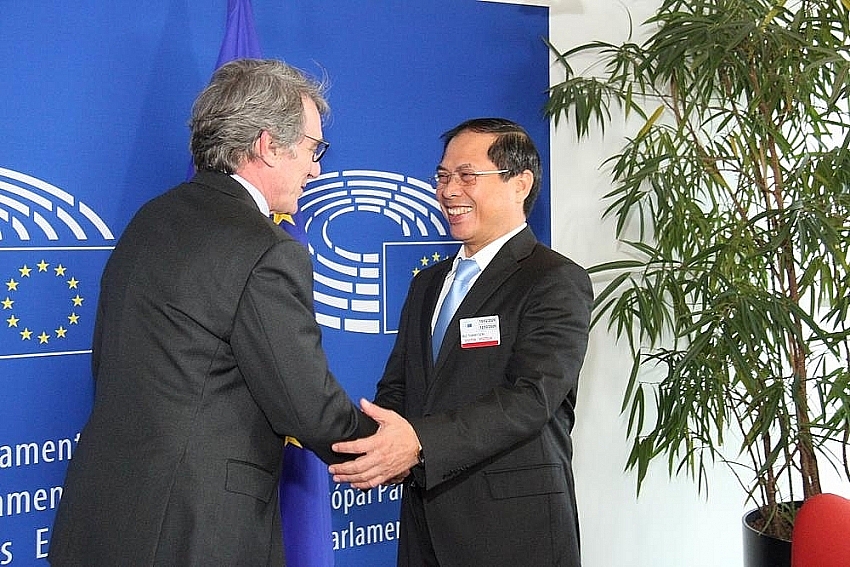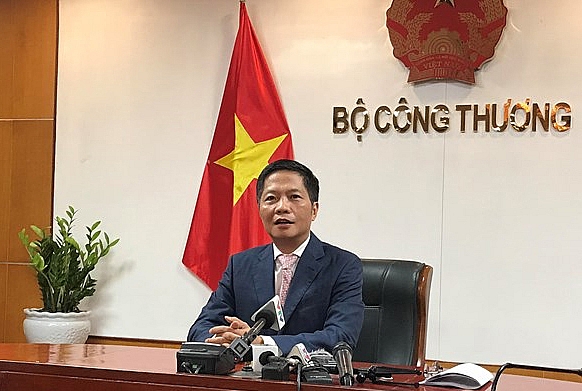European Parliament approves historic FTA with Vietnam
 |
| The European Parliament has approved the EVFTA and EVIPA |
The European Parliament today (February 12) voted in favour of the landmark free-trade agreement with Vietnam which will eliminate almost all tariffs over the next 10 years.
The EVFTA was voted in favour by 401 European Union lawmakers, with 192 votes against and 40 abstentions. The agreement will remove virtually all customs duties between the two parties over the next 10 years, including on Europe’s main export products to Vietnam.
Vietnam’s National Assembly is expected to vote on the trade pact in May.
The EU already has free trade deals with fellow ASEAN member Singapore, along with Japan and South Korea.
According to a study by the Ministry of Planning and Investment, the EVFTA and EVIPA are expected to increase Vietnam's GDP by 4.6 per cent and exports to the EU by 42.7 per cent by 2025. The European Commission estimates that the GDP of the EU will increase by $29.5 billion and exports to Vietnam by 29 per cent by 2035.
Besides, the EVFTA also has extensive commitments on services, government procurement, as well as labour and intellectual property. Once approved by the National Assembly of Vietnam, the EVFTA will take effect immediately. Following EU internal procedures, the EVFTA needs to be ratified by the EP and then approved by the European Council to take effect. As for the EVIPA, this agreement must be ratified by both the EP and the parliaments of all 27 EU member states.
 |
| Minister of Industry and Trade Tran Tuan Anh hold a press release on EVFTA |
Telling VIR about the EVFTA process, Minister of Industry and Trade Tran Tuan Anh said that the last step has been approved before the agreement can be put into effect in July or August. The EU is interested in not only the economic gains in Vietnam, but also the issues related to environment and sustainable development.
"We should be confident of being a reputable partner of the EU. In the time coming, we need the approval of Vietnam's National Assembly, while the EU-side will complete the remaining procedures on their part. The agreement is expected to be put into effect in July or August," the minister said.
The minister also pointed out some tasks to improve the competitiveness of the Vietnamese economy, including restructuring the economic sectors, developing the domestic market, as well as protecting the interests of local people and businesses.
Nicolas Audier, chairman of the EuroCham in Vietnam, said “This is an historic moment for EU-Vietnam relations, and one which will open the door to a new chapter of increased trade and investment between our two sides. It will enable European business to be at the forefront of the next phase of Vietnam’s socio-economic development, and ensure that Vietnamese companies and consumers have privileged access to European markets, products, and services. Likewise, EU companies will have greater access to Vietnam’s fast-growing market."
“This vote is the culmination of almost a decade of work. Negotiations began as long ago as 2012, and the EuroCham supported the EVFTA through 12 rounds of dialogue. Since the agreement was concluded in 2015, we have lobbied hard to persuade members of the European Parliament of the benefits of the EVFTA not just to trade – essential though this is – but also to the livelihoods, life chances, and living standards of people in Vietnam," said Audier. "However, today’s vote is not the end of the process. In fact, it is just the beginning. Now, we must ensure the smooth implementation of the EVFTA so that companies and consumers on both sides can unlock the full potential of this agreement. The EuroCham will be an active participant in this process, and we will work with the Vietnamese government, the Vietnam Chamber of Commerce and Industry (VCCI), and our partners to make sure that the benefits agreed to in principle are realised in practice."
Vietnam is the EU's second-largest trade partner in the ASEAN after Singapore, with trade in goods worth €47.6 billion ($51.9 billion) a year and €3.6 billion ($3.9 billion) when it comes to services. EU exports to the country grow by 5-7 per cent annually, yet the EU’s trade deficit with Vietnam was €27 billion ($29.44 billion) in 2018.
The main EU imports from Vietnam include telecommunications equipment, clothing and food products. The EU mainly exports goods such as machinery and transport equipment, chemicals and agricultural products to Vietnam.
What the stars mean:
★ Poor ★ ★ Promising ★★★ Good ★★★★ Very good ★★★★★ Exceptional
Themes: EVFTA & EVIPA
Related Contents
Latest News
More News
- PM orders investment model for North–South high-speed rail (December 22, 2025 | 17:43)
- First members of Danang International Finance Centre revealed (December 22, 2025 | 17:39)
- Securing capital and efficiency for Vietnam’s 2026-2030 growth ambitions (December 17, 2025 | 10:00)
- Driving double-digit growth through green and circular transformation in Vietnam (December 17, 2025 | 09:00)
- Vietnam bucking trend in the global M&A landscape (December 16, 2025 | 14:20)
- Vietnam’s green transition demands collective financial action (December 15, 2025 | 12:00)
- VIR workshop highlights capital and policy for sustainable development (December 15, 2025 | 11:00)
- National Assembly approves pilot mechanisms to accelerate major projects in Hanoi (December 12, 2025 | 11:29)
- Vietnam eases policy approval requirements, simplifies foreign and outbound investments (December 11, 2025 | 17:53)
- Unpacking new momentum in Vietnam’s M&A market (December 10, 2025 | 09:59)

 Tag:
Tag:



























 Mobile Version
Mobile Version